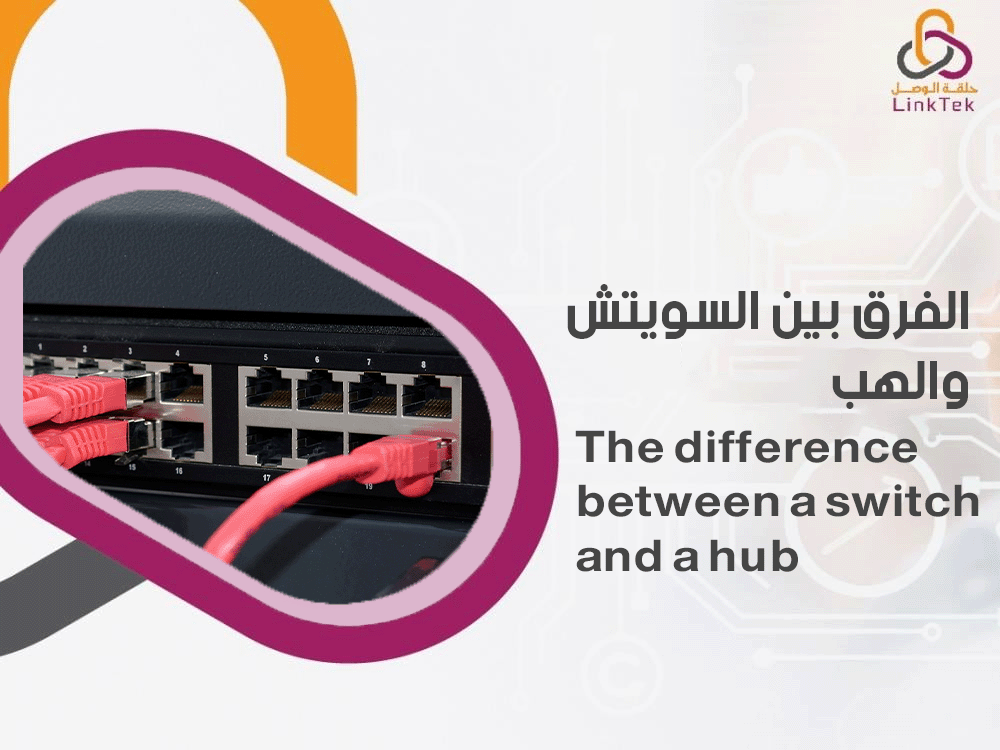
With technological advancement and the advent of the era of entrepreneurship, all commercial activities like companies, offices and different commercial places need to connect their devices to ease the process of data transfer, and of course switch and hub are examples of these devices which aid in facilitating the process of data transfer between different devices. So, what are the differences between switch and hub? What are the advantages of Each of them? And how can you choose between them according to your needs? That's all we are going to know in this article.
What are the differences between switch and hub?
First of all, we will give you a brief identification of each device. switch is a network device that connects a number of devices to ease and facilitate the process of data transfer between these devices inside the local network. switch can do this job according to the MAC address table of these devices that is available for each device connected to the switch. so the switch can Direct bundles of data to the wanted device only, without sending data to other devices. This can be known as intelligent data routing. Switch also contains a number of ports according to the number of devices that can be connected to it. Each port is characterised by a special speed for data transfer.
Hub is known as a network device that connects devices with each other to facilitate data transfer between them. As it looks similar to the switch and it has a similar job to it but it differs in that, the switch can send data to a certain device but Hub will send data to all connected devices. Hub can send data in the broadcast system which means sending data to all connected devices.
Based on what we have previously mentioned we can deduce some of the differences between the switch and the hub, as the difference between the switch and the hub can be summarised in the following points:
- Dealing with data: a switch will send data to a certain device based on the device's MAC address but Hub will send data to all connected devices.
- The speed of data transfer: a switch has a higher speed of data transfer then that of the Hub. Switch distributes the bandwidth to the connected devices, which makes the speed of the switch faster than the hub, in which devices share the bandwidth, which reduces the device’s speed, especially with crowded networks.
- Safety: as the level of safety and switch devices is higher than that in the Hub devices this appears especially when hub sends data to all connected devices rather than switch which sends data only to a certain device.
- Price: as hub devices are lower in their specifications characteristics, so hub prices are less than switch prices as switches have higher specifications and characteristics.
- Operation system: as hub devices don't have an operation system but some switches can have operation systems.
- OSI layer classification: hub and switch are different in the behaviour of each of them in the OSI sample (OSI sample represents the method in which devices deal with networks). Hub devices belong to the first layer, which is the physical layer, where dealing occurs through cables, while the switch belongs to the second layer which is the data link layer and to the third layer which is the network layer.
- Easy network management: switches can give the ability for advanced management that enables users to manage them easily and remotely, otherwise hub devices which don't have this property.
In conclusion, switch devices are more complicated than hub devices and have a number of advanced properties that enable them to do advanced functions better than hub devices, which are less complicated and can do fewer functions, but are simpler and easier to use.
How do you choose between switch and hub? Which one suits your needs?
We have mentioned the main differences between switch and hub, you may have chosen between them, and you can know which one suits you more but in the following paragraph we will give you more detailed information to help you make your decision.
- Price is the first point that may control your decision in the choice between switch and the Hub, and as we mentioned before hub is cheaper than switch so if your budget is not high you can get a hub and it can help you.
- Network capacity is another factor that controls your choice between hub and switch. In small networks such as that of homes and offices hub can be a suitable choice, but in large networks that contain a large number of devices switches are a better solution.
- Safety and security is another point you need to consider while choosing between hub and switch, as safety in switch devices is more easily obtained than in hub devices.
- If you want to have advanced management features, you can buy a switch device, while if you do not need these features, you can buy a Hub device.
The main difference between switch and the Hub is that switches are more complicated than hub devices, and as we mentioned before switch can send data to a certain device while hub can only send the data to all connected devices. Switches contain more advanced functions and more advanced safety and security features, so if you need to get advanced functions and security features you can get a switch, while if you need to get a cheap device they can transfer data between your devices you can buy a hub.

